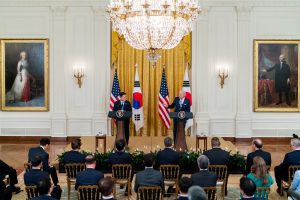Given the fact that the Moon Jae-in government in South Korea had never expressed explicit support for or earnestly cooperated with the U.S. Indo-Pacific strategy before, the level of agreement reached at the Moon-Biden Summit in May 2021 was surprisingly high. The U.S.-Republic of Korea (ROK) Leaders’ Joint Statement states that the two countries “share a vision of a region governed by democratic norms, human rights and the rule of law at home and abroad.” In particular, by stating that “the significance of U.S.-ROK relationship extends far beyond the Korean Peninsula,” the two leaders agreed to expand the geographical scope, role, and agenda of the South Korea-U.S. alliance to regional and global levels
Also, it is quite surprising that the language Washington uses in its Indo-Pacific narratives was directly applied in the summit documents without any modifications. It seems that Seoul pledged and acknowledged its commitments to engage with the U.S. Indo-Pacific initiative. Nevertheless, it is hard to say that the Moon government has finally made a strategic decision to join the U.S. Indo-Pacific strategy.
First, it is true that Seoul has taken a step forward with regard to the U.S. Indo-Pacific initiative, but it did so only within a limited scope that would be tolerable to China. Regardless of the pledges made at the summit, Seoul keeps holding tight to its strategic framework of keeping a balance between Washington and Beijing. For example, while the summit document touches upon most of critical issues in the Biden administration’s Indo-Pacific agenda vis-à-vis China, such as human rights issues, Taiwan, the South China Sea, and so on, Seoul has taken great care by not specifically mentioning “China,” which is quite a contrast to the U.S.-Japan Leaders’ Joint Statement from the Biden-Suga summit last April.
In addition, the Moon government seems to have carefully coordinated with the U.S. so that the outcome of the summit would not be interpreted as direct criticism against China. In fact, there is no direct mention of South Korea’s “participation” in the U.S. Indo-Pacific Strategy in the joint statement. Instead, it is stated that the South Korea-U.S. bilateral cooperation “anchors our respective approaches to the Indo-Pacific region.”
The strategic message that Seoul intends to send out to Beijing is clear: South Korea is pursuing its own regional initiative — the New Southern Policy — independent from, and without directly participating in, the U.S. Indo-Pacific strategy. For this reason, unlike the Biden-Suga summit, which triggered a strong response from Beijing, China’s reaction to the Moon-Biden summit was quite moderate, without any strong complaints. In this way, the Moon government was able to accommodate the Biden administration’s desire to have Seoul on board with the Indo-Pacific coordination without antagonizing China.
Seoul is expected to play a greater regional role for peace and prosperity in the Indo-Pacific. However, unless South Korea abandons its elusive quest for strategic balance between the two great powers, it is less likely that the Moon government would join forces with the U.S. Indo-Pacific coordination in the days ahead. This explains why South Korea under the Moon government has distanced itself from, and hardly participated in, the Indo-Pacific coordination with the U.S. up until now.
Furthermore, Seoul has strategically left sensitive security and strategic issues out of the scope of the New Southern Policy, and remained passive on regional security issues that were sensitive to China, such as freedom of navigation in the South China Sea or issues pertaining to international law and order in the region. As long as Seoul keeps prioritizing the strategic balance framework, it is quite unlikely for South Korea to take a clearer position and action on regional security issues like South China Sea, or on the promotion of human rights and democracy as in the case of the Myanmar situation, or to share a deeper strategic understanding with the U.S. on major regional security issues.
Also, Seoul will have to engage in greater cooperation with like-minded countries participating in the Quad. At the summit, South Korea and the U.S. agreed to cooperate in the areas of climate change, advanced technologies, vaccine supplies, and more. Since the Quad members also agreed to work together in these areas, South Korea will be effectively participating in Quad cooperation via bilateral coordination with the United States.
Of course, getting closer to the Quad is obviously not what Beijing expects from Seoul, and China could coerce South Korea to stay away from the Quad, if necessary, like it did in the case of THAAD. However, it is clear by now that the Quad is not going to be an “Asian NATO” or the military and security mechanism China fears. There is no reason for South Korea not to engage with Quad in functional cooperation in areas where Seoul has keen strategic interests as well as competitive strengths.
Given the Moon government’s strong inclinations to keep its overall strategic balance with Beijing, it is uncertain and remains to be seen how much Seoul is willing to implement its Indo-Pacific commitments and pledges into real actions and tangible outcomes in the coming future. Seoul needs enlighten itself out of the preoccupation with the strategic balance framework, and realize that greater Indo-Pacific engagement with the U.S., and other like-minded countries, will not only enhance its strategic options and relevance as a robust middle power, but also serve as useful strategic assets in engaging with China in a more constructive way.

































